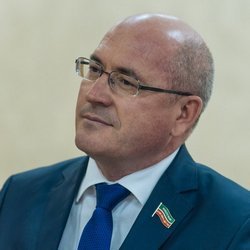‘We know little about each other’: Tatarstan to do Big Ethnographic Dictation
Why “lessons on friendship and harmony” are important and what problems the international educational campaign can solve
Big Ethnographic Dictation international educational campaign will take place in Tatarstan as well as across Russia from 3 to 7 November, which is dedicated to the Union Day. Last year, 1,7 million from all Russian regions and 123 countries of the world joined it. The organisers hope that this year the campaign will include much more people and countries. The main goal of the dictation is to arouse Peoples’ desire to their ethnicity’s culture and traditions. This became topical during the Russian census too. At the same time, experts cite a number of problems: today the school doesn’t have a systematic approach to ethnographic education. Read in Realnoe Vremya’s report how the Big Ethnographic Dictation will be held in Tatarstan and how the republic works to raise ethnographic literacy.
20 federal and 10 regional questions
The 2021 Big Ethnographic Dictation will be both online and offline. The online campaign will start at 00.01 Moscow time on 3 November on the official page of the event, miretno.ru. One can do the dictation offline at the Peoples’ Friendship House at 11.00. Also, the campaign will take place in other places in Kazan — in the Central Urban Library on 10, Vishnevsky Street, Kazan’s Tourism Development Committee, Gymnasium No. 22 and a number of schools. 244 sites are designed to give the ethnographic dictation in the republic’s districts. It can be taken in Russian, English, Spanish and Chinese.

The dictation will be in test mode. All participants are asked 20 questions, which is the federal part, and 10 questions are the regional part designed by ethnographers and leading scientists of Kazan Federal University.
“10 questions are very little, of course. The main message of the regional part is to illustrate all the components of our territory, precisely our region, all the ethnicities living here. For foreigners, the tests consists of 30 questions that are the same for all countries,” the vice minister added.
The highest sum of points one can score for the dictation is 100. 45 minutes are given to do all the tasks. Every participant in the event will be given a certificate that will explain what questions were answered correctly and what not.
In 2020, 1,7 million people from all Russian regions and 123 countries of the world joined the campaign. This year, the coverage of the ethnographic dictation will be bigger, the organisers hope. According to Director of the Tatarstan Peoples’ Friendship House Irek Sharipov, members and directors of national and cultural associations, schoolchildren, foreigners, performers account for the main contingent of the event.
“The task is to raise ethnographic literacy”

“And it grows. So if 10 years ago the republic had two friendship houses and 11 representative offices, branches of the Tatarstan Peoples’ Assemblies, today we have more than 30 offices, 13 houses and Peoples’ friendship centres. And our calculations show that there are nearly 800,000 people who are involved in following the state national policy, interethnic relations. In other words, one in four citizens of our republic somehow participates in our events. It is a big army of people who can be considered ethnographically literate,” Sharipov continued.
Working in this direction, the Peoples’ Friendship House in Kazan organises friendship and harmony lessons, Sharipov said. These classes have been offered for 7 years. Sometimes they are given outside Kazan. Now it is mainly a public movement, activists’ movement. Friendship and harmony lessons have lately started to be offered within the Pushkin Card project. The idea of such classes appeared because the modern school doesn’t have a systemic approach to ethnographic education.
“Today issues of ethnographic education refer more to self-education,” the speaker noted. “The school doesn’t have such a special subject that would separately ask these questions. It is classes on history, social studies and geography, economics. These subjects can teach the lay-out of our state, how interethnic relations are built. But there is a lack of a systemic approach.”
At the same time, for instance, Singapore offers racial harmony classes four times a week, Sharipov notes. In his opinion, ethnographic literacy doesn’t play the last role in interethnic relations.
“To make sure society has peace and harmony, it is necessary to know and understand the history and specifics of each of the ethnicities that live here,” says the director of the Peoples’ Friendship House. “We always tell children that we should understand what relations between ethnicities are correct and what relations aren’t permitted, what words shouldn’t be used, what shouldn’t be paid attention. This is why the Big Ethnographic Dictation is precisely aimed to draw everybody’s attention to the fact that ethnographic literacy is our sore point.”
“There is a trend for a change in the national composition of continents, countries”
These issues are especially topical now, during the Russian Census. Sharipov claimed that a noticeable difference between the results of the previous and current censuses is expected.
“It is a year of big breakthroughs in migration,” the speaker explained. “In general there is a global trend for a change in the national composition of continents, countries, including ours, regions. For us, the assembly of the Tatarstan Peoples’ Friendship, it is working documents, and I have them on my table. Going to any settlement, we find census results and see the ethnic composition of these districts and cities. And we see in our work that it has considerably changed in the last 10 years. Before the pandemic, Tatarstan regularly accepted and registered up to 300,000 foreign citizens. They came and left. But in general migration services’ work is determined by these numbers. Our Kazan Federal University is Russia’s second university in number of foreign students. Moscow Peoples’ Friendship University is first. Our republic, Kazan is in general a point of attraction of foreign students. And the labour market in Tatarstan is also very attractive.”